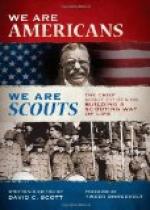Beckwith laughed and answered, “Well, Kit, I see I am not the only durned fool in the country. You seem to be caught in the same scrape with me,” and for the next half hour it was amusing to hear the jokes these three old friends tossed at each other, for, of course, Bridger joined in.
After they had their fun with each other, Carson asked Beckwith what he was doing there. Beckwith answered, “I have staked off a claim here, Kit. It is not a claim either. It is a farm,” and he pointed to a little bunch of timber a short distance from our camp. “I intended to build a cabin in that grove of timber,” which he afterwards did, and he lived there about thirty years and died there about fourteen years ago as I was informed a year ago, when I was in Denver for the first time since Carson, Bridger and I camped on his claim.
When Jim Beckwith told us that he had taken up land and was going to build on it and make himself a home there, I wondered what he would do to make a living. The land seemed to be fertile enough, but I did not see any chance to sell what he might raise if he tried farming, but I was told that he cultivated the land for awhile and then it was too valuable. So he cut it up into lots and sold it, and now it is covered with business houses and residences, and all this change has taken place in forty-nine years.
As I stood and looked at the streets and blocks of houses, I found myself almost doubting that that was the spot where we had camped forty-nine years ago. When memory called back to my mind what a barren, desolate country it was at that time, it almost seemed incredible that such a large city could be built and such a vast change be made in less than fifty years, and not only in this particular spot but for miles and miles all through the surrounding country.
While we were in camp, I was down on the banks of Cherry Creek one day, and there were fifteen or twenty Indians sitting on the bank, and among them was a squaw who had a pistol in her hand. She seemed to be playing with it when several white men came along, and one of them was intoxicated. This one went up to the squaw and, taking hold of the pistol, tried to wrench it from her hand, and in the struggle the pistol was discharged and the man dropped dead. Some of his companions threatened to take vengeance on the Indians, but there were so many other white men standing around that had witnessed the whole affair and knew the Indians had done nothing to be molested for, they would not allow the Indians to be troubled. So the men took the body away, and that was the end of the affair.
That evening a band of Kiawah Indians came into the town and camped where the statehouse now stands. I happened to meet some of them, and being acquainted with them I stopped and talked with them, and they told me that they were going to have a peace smoke and a dance next day, and they wanted me to join them, which, knowing it would not be wise to decline, I promised to do.




